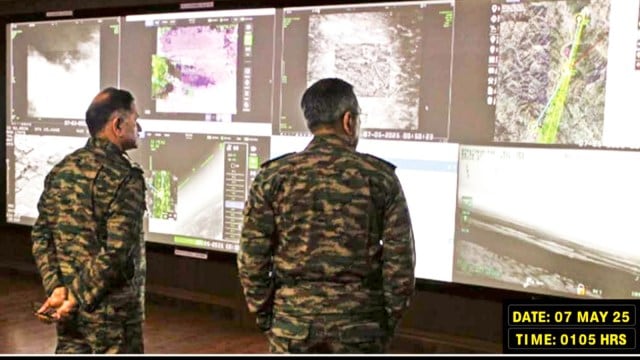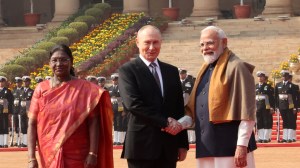A senior Indian military officer acknowledged last month that the Indian Air Force (IAF) lost “some aircraft” during Operation Sindoor because of the “constraint” laid down by the Indian political leadership not to attack the Pakistani military establishment or their air defences.
This was detailed by Captain Shiv Kumar, India’s Defence Attache to Indonesia, during a presentation at a seminar in Jakarta on June 10. In the presentation, he also stated that after the initial setback, Indian forces adjusted their strategy, while clarifying that although the skirmish continued till May 10, India incurred losses only on May 7.

Captain Kumar said the Indian forces had been directed not to target Pakistan’s military infrastructure or air defences. “Only because of the constraint given by the political leadership to not attack the military establishment or their air defences,” he said, explaining why the IAF suffered the loss of fighter jets.
“After the loss, we changed our tactics and we went for the military installations… We first achieved suppression of enemy air defences and then… all our attacks could easily go through using BrahMos missiles,” he said.
Captain Kumar’s statement marks the first instance of an Indian military officer attributing a reason as to why India lost aircraft in Operation Sindoor. It is also the first time that an Indian military officer has thrown light on the modified tactics adopted by India after suffering initial losses during the operation.
After his remarks came to light, Congress communications chief Jairam Ramesh sought clarification from the government. “Why is the PM refusing to preside over an all-party meeting and take the Opposition into confidence? Why has the demand for a special session of Parliament been rejected?” he said in a post on X on June 29.
Later, the Indian Embassy in Jakarta issued a clarification, saying that he was quoted out of context and was simply reiterating that Operation Sindoor aimed to target terrorist infrastructure.
Story continues below this ad
“His remarks have been quoted out of context, and the media reports are a mis-representation of the intention and thrust of the presentation made by the speaker, the embassy said.
“The presentation conveyed that the Indian Armed Forces serve under civilian political leadership, unlike some other countries in our neighbourhood,” it added, in a veiled jab at Pakistan.
What the armed forces had said earlier
Before this, top Indian military officers had publicly acknowledged that India had suffered some aircraft losses, but had cautiously held back the reasons and the tactical changes adopted thereafter.
For instance, last month, Chief of Defence Staff General Anil Chauhan had acknowledged losses during the early phases of Operation Sindoor, but did not offer specific numbers. He had told news agencies in Singapore why the jets were downed, and the way forward warranted greater importance than the number of IAF fighters downed. He also said that after suffering losses in the air initially, India had rectified its tactics and went back in large numbers deep inside Pakistan to hit their airbases.
Story continues below this ad
His comments marked India’s first official admission to a global audience of having lost an unspecified number of jets in the operation, although India had never denied such losses.
The only other official comment on this matter was made by Air Marshal A K Bharti, Director General Air Operations, IAF, in an official briefing in May, where he had said that losses are part of any combat, the Indian military had achieved all its selected objectives and all IAF pilots were back home. He had said that he would not like to comment on whether India lost any aircraft in Operation Sindoor due to the prevailing combat situation.
Takeaway from Operation Sindoor: ‘Air defence is very important’
Captain Kumar’s 20-minute detailed presentation was part of a seminar titled ‘Analysis of the Pakistan–India Air Battle and Indonesia’s Anticipatory Strategies’ organised by Suryadarma University, also attended by senior military officials from Indonesia.
While India conducted “punitive strikes” during Operation Sindoor as an act of “political signalling”, with “air power” as the medium of choice, the lessons learnt by the military establishment from this operation are that “air defence is very important”, he said.
Story continues below this ad
On the takeaways from the operation, he said that “air defence is very important and has to be integrated — long-range, medium range, short range, legacy systems, from different OEMs – can be Russian, Indian, Israeli. (We have also learnt) that the era of manned fighter aircraft is not over.”
Out of the 21 terror camps shortlisted by India, “depending on the intelligence, we decided to target nine of them (four in Pakistan and five in Pakistan-occupied Kashmir),” Captain Kumar added.
“The only constraint that the government gave to the armed forces was not to target anything but the terrorist camps — no military installations, no civil installations and nothing which is not connected to terrorists,” he said about the operation.
Born in Chennai, Captain Kumar, 46, holds a Bachelor’s degree from the Naval College of Engineering in New Delhi, and three Master’s degrees in Computer Science Engineering, Defence and Strategic Studies, and Management Studies, as per his bio presented at the beginning of the seminar. He was commissioned into the Navy in January 2002.
Story continues below this ad
Before being appointed as the defence attache at the Embassy of India, Jakarta, with concurrent accreditation to Timor-Leste, he was serving as faculty at the College of Defence Management in Secunderabad.
The officer also threw more light on the evidence India has about Pakistan’s involvement in the attacks, mentioning that besides The Resistance Front claims and eyewitness accounts, technical intelligence confirmed secured communication hubs of terrorists; there were also forensic investigations of recovered digital artefacts.
He said that despite India giving enough time — more than two weeks — after a response across diplomatic, economic and political domains, no concrete measures were taken by Pakistan against terror outfits and infrastructure. “That is when India initiated Operation Sindoor,” he said.
After this, the Indian director general of military operations and the Ministry of Foreign Affairs spokesperson conveyed (to Pakistan) that India has only targeted the terrorist camps and did not wish to escalate further, Kumar said. “This can be the conclusion of the skirmish,” the Indian side conveyed, as per Kumar, also adding that “any more attacks will be taken as a second escalation”.
Story continues below this ad
However, even as Pakistan escalated further after Operation Sindoor, India’s counter-response, he said, was “swift, precise and non-escalatory”. On the nuclear situation, he clarified that even as India has a clear no first-use policy, and also has credible deterrence in place, in case of such an attack, “the retaliation will be massive, and Pakistan will cease to exist”.










